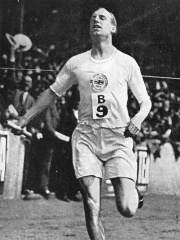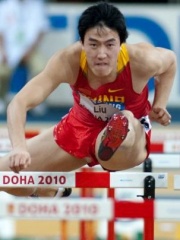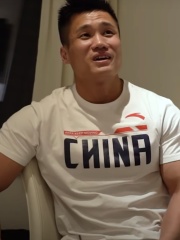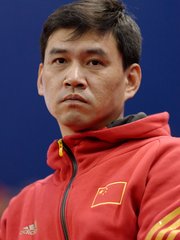







The Most Famous
ATHLETES from China
Top 10
The following people are considered by Pantheon to be the top 10 most legendary Chinese Athletes of all time. This list of famous Chinese Athletes is sorted by HPI (Historical Popularity Index), a metric that aggregates information on a biography's online popularity. Visit the rankings page to view the entire list of Chinese Athletes.

1. Eric Liddell (1902 - 1945)
With an HPI of 62.65, Eric Liddell is the most famous Chinese Athlete. His biography has been translated into 30 different languages on wikipedia.
Eric Henry Liddell (; 16 January 1902 – 21 February 1945) was a Scottish sprinter, rugby player and a Christian missionary. Born in Tianjin, China to Scottish missionary parents, he attended a boarding school near London, spending time when possible with his family in Edinburgh, and afterwards attended the University of Edinburgh. At the 1924 Summer Olympics in Paris, Liddell refused to run in the heats for his favoured 100 metres because they were held on a Sunday. Instead he competed in the 400 metres held on a weekday, a race that he won. He became ordained as a Congregational minister in 1932 and regularly taught Bible classes at Morningside Congregational Church, Edinburgh. He returned to China in 1925 and served as a missionary teacher. Aside from two furloughs in Scotland, he remained in China until his death in a Japanese civilian internment camp in 1945. Liddell's Olympic training and racing, and the religious convictions that influenced him, are depicted in the Oscar-winning 1981 film Chariots of Fire, in which he is portrayed by fellow Scot and University of Edinburgh alumnus Ian Charleson.

2. Li Hong (0 - 675)
With an HPI of 62.25, Li Hong is the 2nd most famous Chinese Athlete. His biography has been translated into 8 different languages.
Li Hong (652 – 25 May 675) was a crown prince of the Tang dynasty of China. He was the fifth son of Emperor Gaozong and the eldest son of his second wife Empress Wu (popularly known as Wu Zetian). After being titled Prince of Dai (代王) in 655, he became crown prince in 656. As he grew older, he often came in conflict with his ambitious and powerful mother and it is believed by traditional historians that she poisoned him to death in 675. His father Emperor Gaozong, then still reigning, posthumously honored him with an imperial title.

3. Karen Lachmann (1916 - 1962)
With an HPI of 55.17, Karen Lachmann is the 3rd most famous Chinese Athlete. Her biography has been translated into 18 different languages.
Karen Vilhelmine Lachmann (30 May 1916 – 30 September 1962) was a Danish foil fencer. She won a silver medal in the women's individual foil event at the 1948 Summer Olympics and a bronze in the same event at the 1952 Summer Olympics.

4. Zhu Jianhua (b. 1963)
With an HPI of 52.43, Zhu Jianhua is the 4th most famous Chinese Athlete. His biography has been translated into 23 different languages.
Zhu Jianhua (simplified Chinese: 朱建华; traditional Chinese: 朱建華; pinyin: Zhū Jiànhuá; born 29 May 1963) is a retired Chinese high jumper. His personal best of 2.39 metres is a former world record for the event, and is still the Chinese record. In Helsinki 1983, Zhu became China's first man to win a medal in the IAAF World Championships. In the 1984 Los Angeles Olympics, he became the first male from the People's Republic of China to win an athletics medal in the history of the Olympic Games (Yang Chuan-kwang won a silver medal representing the Republic of China in the 1960 Rome Olympics). He is a two-time gold medallist at both the Asian Games and the Asian Athletics Championships.

5. Wang Junxia (b. 1973)
With an HPI of 52.03, Wang Junxia is the 5th most famous Chinese Athlete. Her biography has been translated into 30 different languages.
Wang Junxia (simplified Chinese: 王军霞; traditional Chinese: 王軍霞; pinyin: Wáng Jūnxiá; born 9 January 1973) is a Chinese former long-distance runner who is the current world record holder at 3,000 meters. She also held the world record for the 10,000 meters for 23 years, between 1993 and 2016, which is a record in itself. Her best years were from 1991 to 1996. Wang was coached by Ma Junren until 1995 and by Mao Dezhen from 1995 to her retirement after the 1996 Atlanta Olympics.

6. Liu Xiang (b. 1983)
With an HPI of 51.97, Liu Xiang is the 6th most famous Chinese Athlete. His biography has been translated into 46 different languages.
Liu Xiang (simplified Chinese: 刘翔; traditional Chinese: 劉翔; pinyin: Liú Xiáng; born July 13, 1983) is a Chinese former 110 meter hurdler. Liu is an Olympic gold medalist and world champion. His 2004 Olympic gold medal was China's first Olympic gold medal in men's athletics. Liu is one of China's most successful athletes and has emerged as a cultural icon. On top of being the only male athlete in history to be the 110-metre hurdles world record holder, world champion, and Olympic champion, Liu remains the Olympic record holder for the men's 110-metre hurdles with a time of 12.91 seconds he set at the 2004 Athens Olympics. He was the favorite to win another gold in the 110 metre hurdles at the 2008 Beijing Olympics, but had to withdraw from competition at the last moment after a false start and aggravation to a previously unrevealed injury. Again a gold medal favourite in the 110 metre hurdles at the 2012 London Olympics, he pulled his Achilles tendon while attempting to clear the first hurdle in the heats. On 7 April 2015, he announced his retirement on Sina Weibo.

7. Álvaro Fernández (b. 0)
With an HPI of 50.43, Álvaro Fernández is the 7th most famous Chinese Athlete. Their biography has been translated into 11 different languages.
Álvaro Fernández may refer to: Alvaro Fernández de Valladares (died 1212), Spanish commandant Álvaro Fernández Armero (born 1969), Spanish director Álvaro Fernández (athlete) (born 1981), Spanish runner Álvaro Fernández (Uruguayan footballer) (born 1985), Uruguayan footballer Álvaro Fernández (footballer, born 1998), Spanish football goalkeeper Álvaro Fernández (footballer, born 2003), Spanish football defender

8. Qu Yunxia (b. 1972)
With an HPI of 49.91, Qu Yunxia is the 8th most famous Chinese Athlete. Her biography has been translated into 25 different languages.
Qu Yunxia (simplified Chinese: 曲云霞; traditional Chinese: 曲雲霞; pinyin: Qǔ Yúnxiá; born 25 December 1972) is a Chinese Olympic athlete who specialised in the 1500 metres. At the 1992 Summer Olympics in Barcelona, she won a bronze medal in 1500 m. On 11 September 1993, she set the world record in the 1,500 metres at 3:50.46 minutes while running in the National Games of China in Beijing. The record stood 22 years, until broken on 17 July 2015, by Genzebe Dibaba who was the only non-Chinese athlete to seriously challenge the mark during that period. She won the 3000 metres at the 1993 World Championships in Athletics, setting what will likely be the permanent Championship Record in the event due to women switching to the 5,000 metres distance beginning in 1995.

9. Huang Zhihong (b. 1965)
With an HPI of 49.71, Huang Zhihong is the 9th most famous Chinese Athlete. Her biography has been translated into 23 different languages.
Huang Zhihong (simplified Chinese: 黄志红; traditional Chinese: 黃志紅; pinyin: Huáng Zhìhóng); born May 7, 1965, in Lanxi, Jinhua, Zhejiang) is a former shot put athlete from China. An Olympic silver medalist and a two-time world champion, she was the first Asian to win a world championship in athletics. Her personal best throw is 21.52, achieved in Beijing 1990.

10. Lü Xiaojun (b. 1984)
With an HPI of 49.49, Lü Xiaojun is the 10th most famous Chinese Athlete. His biography has been translated into 25 different languages.
Lü Xiaojun (Chinese: 吕小军; pinyin: Lǚ Xiǎojūn, born 27 July 1984) is a Chinese weightlifter. He is a three-time Olympic champion and five-time world champion competing in the 77 kg category until 2018 and 81 kg starting in 2018 after the International Weightlifting Federation reorganized the categories.
People
Pantheon has 405 people classified as Chinese athletes born between 1902 and 2007. Of these 405, 400 (98.77%) of them are still alive today. The most famous living Chinese athletes include Zhu Jianhua, Wang Junxia, and Liu Xiang. The most famous deceased Chinese athletes include Eric Liddell, Li Hong, and Karen Lachmann. As of April 2024, 61 new Chinese athletes have been added to Pantheon including Wang Hong, Yang Xiao, and Lai Runming.
Living Chinese Athletes
Go to all RankingsZhu Jianhua
1963 - Present
HPI: 52.43
Wang Junxia
1973 - Present
HPI: 52.03
Liu Xiang
1983 - Present
HPI: 51.97
Álvaro Fernández
HPI: 50.43
Qu Yunxia
1972 - Present
HPI: 49.91
Huang Zhihong
1965 - Present
HPI: 49.71
Lü Xiaojun
1984 - Present
HPI: 49.49
Li Meisu
1959 - Present
HPI: 49.42
Wang Liping
1976 - Present
HPI: 49.20
Xu Haifeng
1957 - Present
HPI: 48.87
Wang Yifu
1960 - Present
HPI: 48.53
Sui Xinmei
1965 - Present
HPI: 48.48
Deceased Chinese Athletes
Go to all RankingsEric Liddell
1902 - 1945
HPI: 62.65
Li Hong
HPI: 62.25
Karen Lachmann
1916 - 1962
HPI: 55.17
Li Lingjuan
1966 - Present
HPI: 49.13
Han Xu
1924 - 1994
HPI: 41.85
Newly Added Chinese Athletes (2025)
Go to all RankingsWang Hong
1965 - Present
HPI: 46.21
Yang Xiao
1964 - Present
HPI: 45.70
Lai Runming
1963 - Present
HPI: 44.46
Ma Xiangjun
1964 - Present
HPI: 44.36
Tan Liangde
1965 - Present
HPI: 43.77
Liu Shoubin
1968 - Present
HPI: 43.47
He Ying
1977 - Present
HPI: 43.09
Li Chunxiu
1969 - Present
HPI: 42.56
Zeng Guoqiang
1965 - Present
HPI: 42.27
Ye Chong
1969 - Present
HPI: 42.07
Sun Ribo
1976 - Present
HPI: 40.77
Wang Xiaozhu
1973 - Present
HPI: 40.26
Overlapping Lives
Which Athletes were alive at the same time? This visualization shows the lifespans of the 3 most globally memorable Athletes since 1700.




















